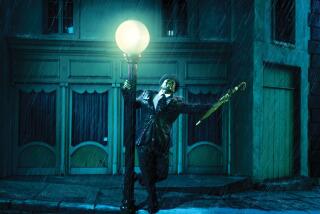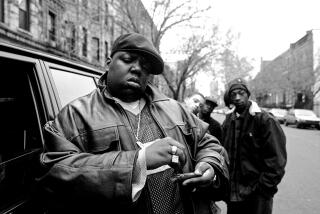Shhh! Don’t talk, drink or fight in the library
Drunks in tutus, drugs in bathrooms and chick fights in parking lots don’t sound like the stuff of a librarian’s memoir, but Don Borchert’s book has them all.
In his recently published “Free for All: Oddballs, Geeks, and Gangstas in the Public Library,” Borchert culls the strangest stories from his 13 years as an assistant in a small Torrance branch library. With wry humor, he offers an insider’s look at how a would-be sanctuary has become, as his title suggests, a catch-all gathering place where devoted readers are joined by Internet-savvy latchkey kids, semi-homeless misfits and everybody in between. The result has librarians talking -- some not so nicely -- about changes in their image and their place of work.
“Everyone knows about the library, but they just see it from the front,” Borchert, 58, said recently over lunch near his branch, appearing every bit the librarian -- soft-spoken, white-haired, wire-rim-spectacled and possessed of the patience of a man who’s answered countless patron queries over the years. “There’s so much else happening that’s probably universal to libraries, which is what I wanted to put down on paper.”
Librarians are praising the book for busting some of the stereotypes of their profession -- though some say Borchert does not go far enough.
Scott Douglas, who writes the popular Web column Dispatches From a Public Librarian for McSweeney’s Internet Tendency and is the author of the upcoming book “Quiet Please,” objects to Borchert’s claim that librarians are natural introverts. As Douglas wrote on his blog, the stereotype “may be true of librarians fifty years ago, but it’s certainly not true today!” Douglas blames Hollywood -- movies like “It’s a Wonderful Life,” in which Mary Bailey is doomed to be a librarian had her husband never lived, much to his horror.
Then there are those who are upset mostly that Borchert is being called a librarian at all -- the term technically applies only to those who have a master’s degree in the field, which Borchert doesn’t.
“It is a sensitive area for some people. A lot of fields have this sort of caste system,” American Library Assn. President Loriene Roy said. “But to the public, anyone in the library is a librarian.”
Roy noted that the professional aspect of the field does help attract recruits. In the last decade, as more graduate programs have been launched and Internet access has become available at nearly every public library, younger people are entering the increasingly techie-friendly field. Librarian bloggers, a strong presence online (such as the Liberry blog, with its rogues gallery of odd regulars, and the Live Journal community dedicated to librarians who say a certain unprintable epithet), have long provided insight of the Borchert kind into the library world. “I hope if they stereotype us as anything now,” Douglas said, “it would be as hip, young and idealistic. That’ll be the librarian of the future.”
Younger librarians, plus younger patrons, mean a changing library. More are creating bookstore atmospheres by adding cafes and dropping the Dewey Decimal System for topical categories. Three in four, according to Roy, offer free video gaming events, and of the patrons who attend those programs, well more than half return to the library for other types of events.
Fears that technology -- and the younger crowd that has come of age with it -- would push the library into irrelevancy haven’t been realized. A recent Pew Internet & American Life Project study found that more than 20% of Americans ages 18 to 30 have turned to a library for information about health, jobs, government benefits and other issues, compared with 12% of the general population. Pew also found that library usage actually declines with age.
Still, Borchert has blunt remarks for those younger than 18 and the grown-ups who treat the library as a drop-off day-care center.
“We have kids who would almost convince you that, yes, there is evil in the world,” Borchert said. But, he noted, they have their reasons for misbehaving. “If I were that age, I could do an hour in the library, and after that, you start thinking things like, ‘Will this burn?’ ”
Theresa Babiar, a former colleague of Borchert’s who features prominently in his book and is now a youth librarian at the main branch in Torrance, had another explanation. “Students are just becoming more assertive about what they want, and they question authority more.”
Babiar mentioned that the Internet played a role in kids’ bending library rules too.
“For them it’s a social tool, and they don’t use it quietly. They call their friends over and talk about their profiles,” she said.
But as Borchert’s book shows, being loud is the least offense. A chair was thrown at Borchert, and Douglas and Roy both received death threats.
“In a public setting there’s always some danger,” Roy said. “But most kids are pretty good.”
Kids aren’t Borchert’s only target -- he’s not shy about assessing his colleagues or the system in which they work. Of unions, he writes, “It was a solidarity thing . . . an adorable, romantic notion that neither side seems to believe.” He casually dismisses the idea that a burka worn by a newly hired colleague encourages conservative sexual mores. “I didn’t think she had a real handle on the American male ego and the lengths a male will go to fantasize,” Borchert explained. “For example, phone sex. There’s very little contact going on there, and it’s a billion-dollar industry. . . . Men are pigs, I think we all know this by now.” Of an African American janitor whom Borchert’s editors worried he portrayed too cartoonishly, Borchert said, “That’s who he is. He does this to himself.”
Borchert added, “If I seem to be denigrating anyone, I don’t intend it. So far, the reactions have all been positive.”
That may have something to do with Borchert’s genuine compassion for the people who create a sense of community within the library. Borchert shows schmaltz-free empathy for young regulars who develop relationships with librarians. Some of those ties last for years, as Borchert realized at his first reading in Lomita. Three young women in attendance recalled coming to the same branch, nearly two decades earlier, to listen to then-volunteer Borchert play the accordion.
And Borchert was once one of the good library-going kids himself -- in fifth grade he attended readings, and in high school, Borchert escaped the lunch crowd to read the New Yorker there, where he would be shushed for laughing. Borchert credits his mother with instilling his interest in literature and libraries at a young age, taking him to the library each week when he was a child and reciting poetry to him as an infant.
“She would read ‘Invictus,’ by William Ernest Henley,” Borchert said, repeating a verse from memory. “ ‘In the fell clutch of circumstance / I have not winced nor cried aloud. / Under the bludgeonings of chance / My head is bloody, but unbowed.’ And then she’d coo: ‘Yes it is bloody and unbowed. Yes it is.’ “After studying English in college, Borchert took a succession of odd jobs, including hauling dirt and replacing toilets. He didn’t think about getting a “real job” until after his three daughters were born. He chose the library for its job security and its literary atmosphere.
“There are some good secrets in the world,” Roy said. “And one of them is that working at the library is a pretty good profession, with a lot of diversity.”
Do the changes mean curtains for a library that’s devoted to books and peace and quiet? Borchert is fairly unfazed.
“Some see libraries as fragile,” Borchert said. “But the library of 20 years ago was nothing like the library of today, and will be nothing like the library of five years from now. They’re changing, and we just don’t know what they’re becoming.”
More to Read
Sign up for our Book Club newsletter
Get the latest news, events and more from the Los Angeles Times Book Club, and help us get L.A. reading and talking.
You may occasionally receive promotional content from the Los Angeles Times.






